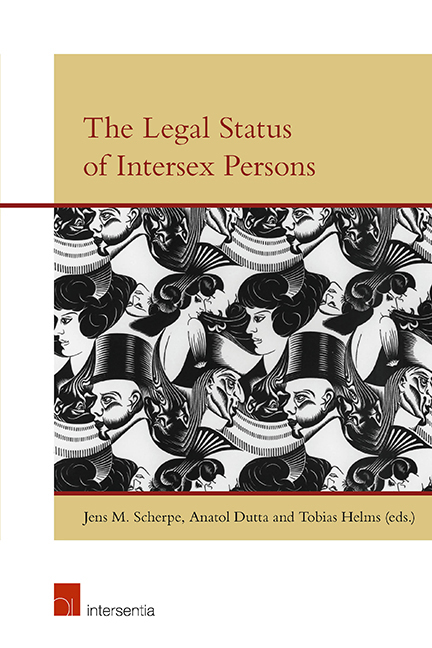Book contents
- Frontmatter
- Preface
- Contents
- List of Contributors
- The Legal Status of Intersex Persons: An Introduction
- Malta Declaration
- Darlington Statement
- Vienna Statement
- PART I MEDICINE AND PSYCHOLOGY
- PART II THEOLOGY AND LEGAL HISTORY
- PART III TRANSGENDER, TRANSSEXUALITY AND INTERSEX
- PART IV NATIONAL LEGAL DEVELOPMENTS
- Australia
- Sweden
- India
- The Netherlands
- France
- Colombia (The Colombian Constitutional Court)
- United States
- Malta
- Germany (The 2013 German Law)
- Germany (German Inter-Ministerial Working Group)
- Germany (Gender Diversity in Law)
- PART V PRIVATE INTERNATIONAL LAW ASPECTS OF INTERSEX
- PART VI INTERSEX AND HUMAN RIGHTS
Malta
from PART IV - NATIONAL LEGAL DEVELOPMENTS
Published online by Cambridge University Press: 31 January 2019
- Frontmatter
- Preface
- Contents
- List of Contributors
- The Legal Status of Intersex Persons: An Introduction
- Malta Declaration
- Darlington Statement
- Vienna Statement
- PART I MEDICINE AND PSYCHOLOGY
- PART II THEOLOGY AND LEGAL HISTORY
- PART III TRANSGENDER, TRANSSEXUALITY AND INTERSEX
- PART IV NATIONAL LEGAL DEVELOPMENTS
- Australia
- Sweden
- India
- The Netherlands
- France
- Colombia (The Colombian Constitutional Court)
- United States
- Malta
- Germany (The 2013 German Law)
- Germany (German Inter-Ministerial Working Group)
- Germany (Gender Diversity in Law)
- PART V PRIVATE INTERNATIONAL LAW ASPECTS OF INTERSEX
- PART VI INTERSEX AND HUMAN RIGHTS
Summary
The Maltese Gender Identity, Gender Expression and Sex Characteristics Act, 2015 (the 2015 Act) has been described as ‘the most expansive, ground-breaking and comprehensive bill of its kind’. This chapter will analyse this Act to assess how it has impacted upon the status of intersex people in Malta.
Over the past few decades discourse about intersex has been divided into two types of discussions: deliberations aimed at achieving recognition of intersex identity which may differ from that recorded at birth, and debates about medical management. While these may seem to be two disparate aims at their core, they concern questions of dignity, respect and the realisation of human rights. It is by addressing simultaneously both sides of the discussions that the 2015 Act earns its praise.
THE PROVISIONS IN THE LEGISLATION
The 2015 Act is ambitious in its aim. It unequivocally states that it will enable both the recognition of a person's gender identity and protect the bodily integrity of people.
THE RIGHT TO GENDER IDENTITY
The 2015 Act states unambiguously that all people have a right to gender identity. This is defined in Article 2 as
each person's internal and individual experience of gender, which may or may not correspond with the sex assigned at birth, including the personal sense of the body (which may involve, if freely chosen, modification of bodily appearance and/or functions by medical, surgical or other means) and other expressions of gender, including name, dress, speech and mannerism.
In Article 3 the legislation outlines the four component elements of this right:
– the recognition of people’ s gender identity;
– the free development of their person according to their gender identity;
– the right to be treated according to their gender identity, and in particular to be identified that way in identity documents; and
– the right to bodily integrity and physical autonomy.
Article 3 further notes that the right requires that the gender identity of the person be respected at all times.
- Type
- Chapter
- Information
- The Legal Status of Intersex Persons , pp. 357 - 368Publisher: IntersentiaPrint publication year: 2018
- 3
- Cited by



